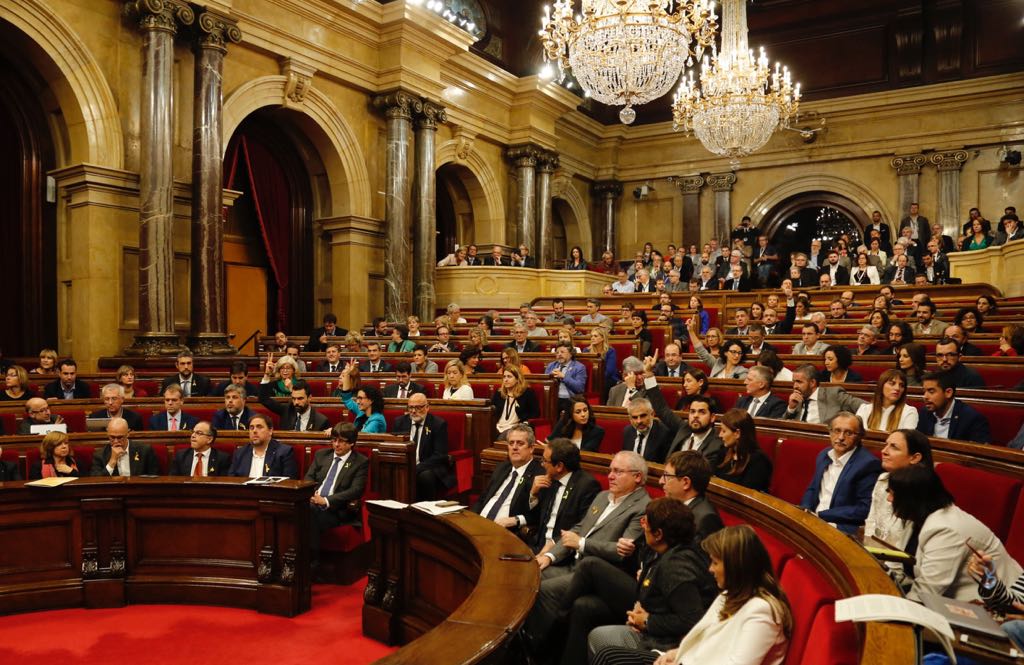The Catalan Parliament has this morning presented to Spain's Constitutional Court an appeal of unconstitutionality against the application of article 155 of the Constitution. The appeal says that the central government's power to intervene in autonomous communities doesn't contemplate either the dismissal of their officials nor the suspension or dissolution of their bodies, and that, as such, the Spanish prime minister, Mariano Rajoy, fell into a "grave violation of the principle of autonomy" recognised in the Constitution when he was attributed with the ability to dissolve the chamber and call an election.
El #Parlament presenta al TC el recurs d'inconstitucionalitat contra les mesures aplicades pel Govern de l'Estat a l'empara de l'article 155 de la Constitució espanyola
— Parlament Catalunya (@parlament_cat) 9 janvier 2018
Podeu consultar el recurs presentat avui al TC https://t.co/Ow9vFvjvbb
Translation: The [Catalan] Parliament presents to the Constitutional Court the appeal of unconstitutionality against the measure applied by the [Spanish] state's government under article 155 of the Spanish Constitution. You can see the appeal presented today to the court [link].
The presentation of the appeal was approved on 27th December by the Parliament's Standing Committee (entrusted with safeguarding the Parliament's powers between legislatures), with votes in favour from JxSí and CSQEP, votes against from Cs, PSC and PP and CUP abstaining.
In November, JxSí had asked the Catalan Council of Statutory Guarantees for a report on article 155. The Catalan government's consulting body concluded that it could be appealed because, among other reasons, the dismissal of the government wasn't a "necessary or indispensable measure".
The report emphasised that "as was revealed in the parliamentary work drafting the Constitution, the possibility of the central power intervening in the autonomous communities didn't include the possibility of dismissing officials nor suspending or dissolving bodies".
According to the appeal, "neither the Spanish government nor the Senate can decide to dismiss the president or government of an autonomous community, much less take on their roles". It says that the dismissal represented a punishment, which isn't the function of article 155, and that it violates the fundamental rights included in the Catalan Statute of Autonomy and the Constitution about the special privileges of the members of the government.
Nor did the Spanish prime minister, Mariano Rajoy, in the opinion of the Catalan chamber's lawyers, have the authority to dissolve the Parliament and call an election, which implied a "grave violation of the principle of autonomy" recognised in the Statute and the Constitution.
Similarly, the lawyers write that based on the interpretation of the law it's clear that article 155 "in no case allows for the adoption of measures that formally or materially involve the suppression or indefinite suspension of the autonomic regime, nor that imply an alteration or innovation in the model of the distribution of powers contained in the bloc of constitutionality" but that it can only be used to "force the autonomous community to meet their constitutional or legal obligations".
Article 155 doesn't authorise indefinitely limiting the position of the autonomous communities and the Statutes, which would require a reform of the fundamental laws. The appeal states that the "actions and measures" adopted under the article have to be "applied gradually" and, as such, "a specific short-term or provisional validity", they have to be be "proportional" and limited to the areas directly linked and essential to achieving the constitutional interest which justifies them.
The appeal also contests the existence of the fault wielded to justify the article's application, both in terms of the declaration of independence, as in its consideration as a breach of constitutional obligations.
It also warns that the introduction of the notification and authorisation system prior to the adoption of any actions imposed on the Catalan government contravenes article 155 and violates the principle of legal security guaranteed by the Constitution.

